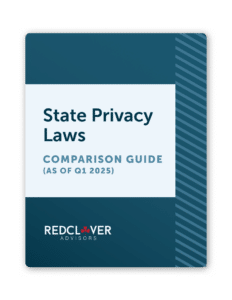“Too much of a good thing.” We usually think of this phrase as it relates to things like working too hard, exercising too much, or binge-watching TV all weekend (just us?).
But the phrase applies across life, work, and even customer loyalty programs.
Today, customer loyalty is a valuable currency. Increasing customer retention by 5% can boost profits by 25% (at least). Recurring customers spend 67 percent more on average than new customers.
So it’s no wonder that customer loyalty programs are a tactic for businesses to retain customers and encourage repeat purchases.
That said, in the past few years, customer loyalty programs have come under fire for violating privacy laws, from collecting too much data to not disclosing how data will be used.
Imagine—in one fell swoop, your “loyalty” program could become the source of a permanent breakup with customers.
If your business offers points, perks, or personalized promotions, protect your company and your customer with a moment of introspection. Ask yourself: Are we complying with privacy laws?
How loyalty programs intersect with data privacy laws
Loyalty programs are often pitched as win-win: customers get perks, businesses get data. But that exchange is increasingly under scrutiny from regulators.
In early 2024, Marriott International and its subsidiary Starwood were hit with two separate settlement orders from the FTC. While the headline was about data breaches, the fine print included requirements specific to their loyalty program, like data minimization, a full account review, and mechanisms for customers to delete their personal information.
In other words, loyalty programs weren’t a side issue. They were central to the enforcement action.
That’s because the data collected through loyalty programs (think: emails, purchase histories, demographics, behavioral patterns) falls squarely within the scope of consumer data protection laws.
If your business offers a loyalty program, you’re likely subject to at least one consumer data protection law—maybe several. That includes the EU’s General Data Protection Regulation (GDPR), Canada’s Personal Information Protection and Electronic Documents Act (PIPEDA), and an ever-expanding range of US state privacy laws.
Most of these privacy laws grant customers specific rights over how their personal data is collected, used, and shared, regardless of how or why that data was collected. If your loyalty program handles personal information (and it almost certainly does), it needs to account for rights like:
- Right to access their personal data
- Right to portability (aka the right to request a copy of their personal data)
- Right to correct inaccurate or incomplete personal data
- Right to object/opt out of the processing, sale, or sharing of personal data, including for target advertising
- Right to delete their personal data
- Right to restrict the processing of their personal data
- Right to limit the use of sensitive personal data
- Rights surrounding automated decision-making and how their personal data can be used
Some states go even further, applying heightened requirements to loyalty programs because they involve the exchange of personal data for benefits.
- The California’s Consumer Privacy Act (CCPA) classifies loyalty programs as “financial incentives.” If you’re offering perks in exchange for personal information, you need to spell that out clearly. The law requires you to disclose the value of the incentive, explain how you calculated it, and provide a dedicated “Notice of Financial Incentive” in your privacy notice.
- Colorado takes a slightly different tack. Under its Privacy Act, data collected for a “bona fide loyalty program” must be strictly necessary for participation. That means you can’t over-collect because it’s convenient. If the data isn’t essential to the reward, you shouldn’t be asking for it.
State Privacy Laws Comparison Guide
Stay ahead of state privacy laws with our guide—clear definitions, key dates, and crucial compliance tips!

How loyalty programs put you at risk for data privacy violations
Loyalty programs are often built on both “zero-party” data (what the customer willingly provides) and “first-party” data (what brands observe through transactions and engagement). These insights are incredibly powerful, but the data has to be handled responsibly.
And here’s something privacy laws don’t always spell out: trust and data quality go hand in hand. When customers are confident in your privacy practices, they’re more likely to share accurate, meaningful information. That leads to better targeting, increased engagement, and more informed business decisions.
To understand where the risks lie, it helps to look at the most common types of data loyalty programs collect and why each can trigger compliance scrutiny:
- Names and emails: These are the basics, but they’re still regulated personal data. If you’re collecting this information without proper consent or storing it without adequate protection, you could violate state or international privacy laws.
- Purchase history: Tracking transactions supports customized offers and builds detailed behavioral profiles. If your privacy notice doesn’t explain how this data is used—or if customers can’t easily restrict that use—you may fall short of requirements under laws like GDPR or CCPA and other state privacy laws.
- Geolocation data: Often collected by mobile apps to offer nearby deals or track visits. Many jurisdictions treat this as sensitive data, which means you’ll need explicit consent. Passive collection or burying the request in a permissions screen isn’t enough.
- Demographic information: Details like age, gender, and household income are useful for segmentation, but collecting this information must be tied to a specific purpose. If customers aren’t told why you need it or how it’s used, that can violate transparency and data minimization requirements.
- Behavioral preferences: Includes data like click behavior, browsing history, and in-app engagement. Collecting and using this information often requires a clear notice and an opt-out mechanism.
The bottom line: Collecting more data means taking on more responsibility.
How to know if your loyalty program is violating privacy laws
The most important step to understanding your loyalty program’s data privacy strengths and vulnerabilities is to conduct a thorough audit of your data practices.
Start with a data inventory to understand how information moves through your organization, from what you collect to how it’s stored, shared, and used. This can help you identify high-risk areas.
Some key questions to answer through this audit include:
1. Are you obtaining clear, informed consent? Consent must be freely given, specific, informed, and unambiguous. This means no pre-checked boxes, vague language, or consent buried in terms and conditions.
Additionally, if you’re offering benefits in exchange for personal data—as many loyalty programs do—California law treats that as a “financial incentive.” If CCPA applies to your business, you need to obtain opt-in consent and clearly explain the value of the offer, how it’s calculated, and how customers can withdraw by way of a dedicated Notice of Financial Incentive in your privacy policy.
2. Do you have a comprehensive privacy notice? Your privacy notice should be updated to reflect loyalty program data practices. It must explain what data you collect, why, how it’s used, who it’s shared with, and how customers can exercise their rights.
It should also be easily readable.
In Colorado, if your program is classified as a “bona fide loyalty program,” the data you collect should be strictly necessary for the program to function; extra data collection “just in case” could be a violation.
3. Can customers participate without sacrificing privacy? Customers should have a meaningful choice to join your loyalty program or not. This isn’t just a best practice: under laws like CCPA and Colorado’s CPA, participation must be voluntary, and opting out can’t restrict access to products, services, or benefits unrelated to the program.
4. Are you respecting “Do Not Sell” and “Opt-Out” rights? If your loyalty program shares personal data with third parties—including analytics providers or ad networks—you may need to include a “Do Not Sell or Share My Personal Information” link under CCPA.
On the other hand, Colorado requires a universal opt-out mechanism and strict limits on the secondary use of personal data collected in loyalty contexts.
5. Are your data security measures strong enough? Collecting data isn’t enough. You need to protect it. Encryption, role-based access controls, role-based privacy training, regular vulnerability scans, and vendor oversight are critical.
6. Are you tracking updates to privacy laws? Privacy laws are evolving rapidly. Consider a quarterly or semi-annual review process to ensure you’re staying compliant. These reviews are a smart step to take, but they’re also required by some laws: Colorado’s law, for example, requires businesses to regularly reassess data practices involving profiling or sensitive data, which are common ingredients in modern loyalty programs.
Checklist for a privacy-compliant loyalty program
Stay in the clear with some practical steps to building a compliant loyalty program:
- Update your privacy policy and loyalty terms with plain language that accurately reflects your data collection practices. This includes disclosures for financial incentives.
- Implement a transparent consent process with tools like consent management portals on your website, allowing users to dictate exactly what they consent to regarding marketing and data collection.
- Build an easy opt-out mechanism. Avoid dark patterns that hide the opt-out or make it frustrating to complete.
- Limit data collection. Don’t collect data “just in case” it might be useful later. Each data point should have a clear, lawful purpose.
- Fortify your data security. Regularly test your system for vulnerabilities. Maintain detailed audit trails to track access and changes to personal data. Use multi-factor authentication.
- Conduct regular privacy reviews. Laws change, and so do your business operations. Regular reviews will help keep anything from falling through the cracks—and identify opportunities to improve your business.
Loyalty programs and data privacy programs go hand in hand.
You don’t have to choose between a strong customer loyalty program and a robust data privacy program. A data privacy program will support customer loyalty, from increasing trust to building a positive brand reputation.
Schedule a consultation with our privacy experts to learn how to improve customer loyalty—and loyalty programs—through smart data privacy governance.


